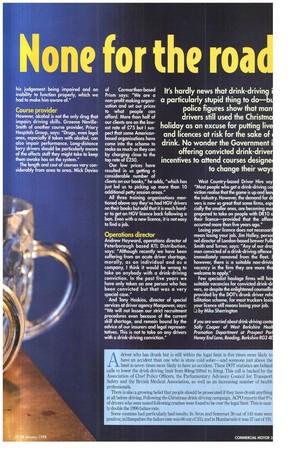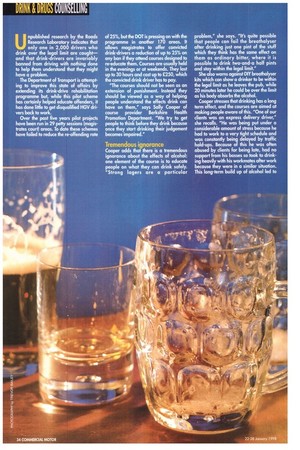None for the roa
Page 37

Page 36

If you've noticed an error in this article please click here to report it so we can fix it.
It's hardly news that drink-driving i a particularly stupid thing to do—b police figures show that man drivers still used the Christma holiday as an excuse for putting liv and licences at risk for the sake of drink. No wonder the Government i offering convicted drink-drive incentives to attend courses designe to change their way
Unpublished research by the Roads Research Laboratory indicates that only one in 2,000 drivers who drink over the legal limit are caught— and that drink-drivers are invariably banned from driving with nothing done to help them understand that they might have a problem.
The Department of Transport is attempting to improve this state of affairs by extending its drink-drive rehabilitation programme but, while this pilot scheme has certainly helped educate offenders, it has done little to get disqualified HGV drivers back to work.
Over the past five years pilot projects have been run in 29 petty sessions (magistrates court) areas. To date these schemes have failed to reduce the re-offending rate of 25%, but the DOT is pressing on with the programme in another 170 areas. It allows magistrates to offer convicted drink-drivers a reduction of up to 25% on any ban if they attend courses designed to re-educate them. Courses are usually held in the evenings or at weekends. They last up to 30 hours and cost up to E250, which the convicted drink driver has to pay. "The courses should not be seen as an extension of punishment. Instead they should be viewed as a way of helping people understand the effects drink can have on them," says Sally Cooper of course provider Berkshire Health Promotion Department. "We try to get people to think before they drink because once they start drinking their judgement becomes impaired."
Tremendous ignorance
Cooper adds that there is a tremendous ignorance about the effects of alcohol: one element of the course is to educate people on what they can drink safely. "Strong lagers are a particular problem," she says. "It's quite possible that people can fail the breathalyser after drinking just one pint of the stuff which they think has the same effect on them as ordinary bitter, where it is possible to drink two-and-a half pints and stay within the legal limit." She also warns against DIY breathalyser kits which can show a drinker to be within the legal limit as he leaves the pub, while 20 minutes later he could be over the limit as his body absorbs the alcohol.
Cooper stresses that drinking has a long term effect, and the courses are aimed at making people aware of this. "One of our clients was an express delivery driver," she recalls. "He was being put under a considerable amount of stress because he had to work to a very tight schedule and was constantly being delayed by traffic hold-ups. Because of this he was often abused by clients for being late, had no support from his bosses so took to drinking heavily with his workmates after work because they were in a similar situation. This long-term build up of alcohol led to his judgement being impaired and an inability to function properly, which we had to make him aware of."
Course provider
However, alcohol is not the only drug that impairs driving skills. Graeme NevilleSmith of another course provider, Priory Hospitals Group, says: "Drugs, even legal ones, especially if taken with alcohol, can also impair performance. Long-distance lorry drivers should be particularly aware of the effects stuff they might take to keep them awake has on the system."
The length and cost of courses vary considerably from area to area. Mick Davies of Carmarthen-based
Prism says: "We are a non-profit making organisation and set our prices to what people can afford. More than half of our clients are on the lowest rate of .£75 but I suspect that some Americanbased organisations have come into the scheme to make as much as they can by charging close to the top rate of £.250.
Our low prices have resulted in us getting a considerable number of clients on our books," he adds, "which has just led us to picking up more than 10 additional petty session areas."
All three training organisations mentioned above say they've had HGV drivers on their books but add that it is much harder to get an HGV licence back following a ban. Even with a new licence, it is not easy to find a job.
Operations director
Andrew Hayward, operations director of Peterborough based KTL Distribution, says: "Although recently we have been suffering from an acute driver shortage, morally, as an individual and as a company, I think it would be wrong to take on anybody with a drink-driving conviction. In the past five years we have only taken on one person who has been convicted but that was a very special case." And Tony Hoskins, director of special services at driver agency Manpower, says: "We will not lessen our strict recruitment procedures even because of the current skill shortage, and remain bound by the advice of our insurers and legal representatives. This is not to take on any drivers with a drink-driving conviction." West Country-based Driver Hire say "Most people who get a drink-driving co viction realise that the game is up and lea the industry. However, the demand for d vers is now so great that some firms, es cially the smaller ones, are becoming mo prepared to take on people with DR10 their licence—provided that the offen occurred more than five years ago."
Losing your licence does not necessari mean losing your job. Jim Halley, perso nel director of London-based brewer Full Smith and Turner, says: "Any of our dra men convicted of a drink-driving offence immediately removed from the fleet. I however, there is a suitable non-drivi vacancy in the firm they are more th welcome to apply."
Few specialist haulage firms will ha suitable vacancies for convicted drink-d vers, so despite the enlightened counselli provided by the DOT's drunk driver reh bilitation scheme, for most truckers losi your licence still means losing your job. Li by Mike Sherrington
If you are worried about drink-driving conta Sally Cooper of West Berkshire Heal Promotion Department at Prospect Par Honey End Lane, Reading, Berkshire RG3 4
Adriver who has drunk but is still within the legal limit is five times more likely to have an accident than one who is stone cold sober—and someone just above the limit is seven times more likely to have an accident, These DOT statistics are behind calls to lower the drink-driving limit from 80mg/100ml to 50nig. This call is backed by the Association of Chief Police Officers, the Parliamentary Advisory Council for Transport Safety and the British Medical Association, as well as an increasing number of health professionals.
There is also a growing belief that people should be prosecuted if they have drunk anything at all before driving. Following the Christmas drink-driving campaign, ACPO reports that 9% of drivers who were tested following crashes were found to he over the legal limit. This is nearly double the 1996 failure rate.
Some counties had particularly bad results. In Avon and Somerset 30 out of 145 tests were positive; in Hampshire the failure rate was 66 out of 355; and in Humberside it was 37 out of 191.






































































































